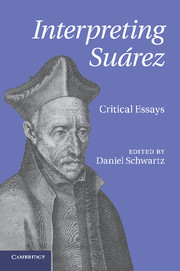Book contents
- Frontmatter
- Contents
- Notes on contributors
- Acknowledgements
- Abbreviations and method of citation
- Chapter 1 Introduction
- Chapter 2 Fundamentals in Suárez's metaphysics: transcendentals and categories
- Chapter 3 The reality of substantial form: Suárez, Metaphysical Disputations xv
- Chapter 4 Suárez on the ontology of relations
- Chapter 5 Suárez's cosmological argument for the existence of God
- Chapter 6 Action and freedom in Suárez's ethics
- Chapter 7 Obligation, rightness, and natural law: Suárez and some critics
- Chapter 8 Suárez on distributive justice
- Chapter 9 Suárez on just war
- Bibliography
- Index
Chapter 1 - Introduction
Published online by Cambridge University Press: 05 December 2011
- Frontmatter
- Contents
- Notes on contributors
- Acknowledgements
- Abbreviations and method of citation
- Chapter 1 Introduction
- Chapter 2 Fundamentals in Suárez's metaphysics: transcendentals and categories
- Chapter 3 The reality of substantial form: Suárez, Metaphysical Disputations xv
- Chapter 4 Suárez on the ontology of relations
- Chapter 5 Suárez's cosmological argument for the existence of God
- Chapter 6 Action and freedom in Suárez's ethics
- Chapter 7 Obligation, rightness, and natural law: Suárez and some critics
- Chapter 8 Suárez on distributive justice
- Chapter 9 Suárez on just war
- Bibliography
- Index
Summary
It has often been observed that Francisco Suárez not only transmitted the achievements of the scholastics to the modern era by influencing Descartes, Leibniz, Wolff, Schopenhauer and Kant, among others, but that he is the very founder of modernity. Scholars disagree on whether this is true, and if it is, whether it should be celebrated or regretted. The purpose of this book is not to adjudicate between these views, but simply to provide a critical exposition of some of Suárez's answers to philosophical questions of the sort that have traditionally exercised philosophers and theologians. The standard used to judge the value of Suárez's works turns not so much on his location within a narrative about the history of philosophy but on the precise presentation of questions, his fair-minded and exhaustive consideration of opposing views, and the cogency and originality of his answers. It is primarily on this score that Suárez deserves our attention.
Life
Francisco Suárez, son of Gaspar Suárez de Toledo and Antonia Vázquez de Utiel, was born in Granada on 5 January 1548. Antonia was the sister of Jesuit theologian and cardinal, Francisco de Toledo (1532–96). According to one Inquisitor their converso grandmother and their grandparents were burned at the stake. Suárez had three brothers and four sisters. At the age of sixteen, after studying canon law in Salamanca for three years, he applied to join the Society of Jesus at their school in Salamanca. The application was unsuccessful: his health was weak, his intellect unpromising. Disappointed but resolute, Francisco went to Valladolid to appeal the decision before the Jesuit Provincial of Castile. Against the opinion of his advisors, the Provincial gave Francisco a chance. He was admitted to the novitiate, but only as a lowly ranked indiferente – someone whose permanent rank within the Society would be determined at a later date.
Keywords
Information
- Type
- Chapter
- Information
- Interpreting SuárezCritical Essays, pp. 1 - 18Publisher: Cambridge University PressPrint publication year: 2011
Accessibility standard: Unknown
Why this information is here
This section outlines the accessibility features of this content - including support for screen readers, full keyboard navigation and high-contrast display options. This may not be relevant for you.Accessibility Information
- 3
- Cited by
